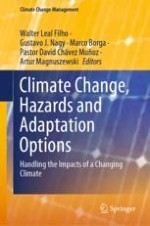2020 | OriginalPaper | Chapter
The Importance of Climate Change Education in Urban Planning: A Review of Planning Courses at UK Universities
Author : Alice Preston-Jones
Published in: Climate Change, Hazards and Adaptation Options
Publisher: Springer International Publishing
Activate our intelligent search to find suitable subject content or patents.
Select sections of text to find matching patents with Artificial Intelligence. powered by
Select sections of text to find additional relevant content using AI-assisted search. powered by
